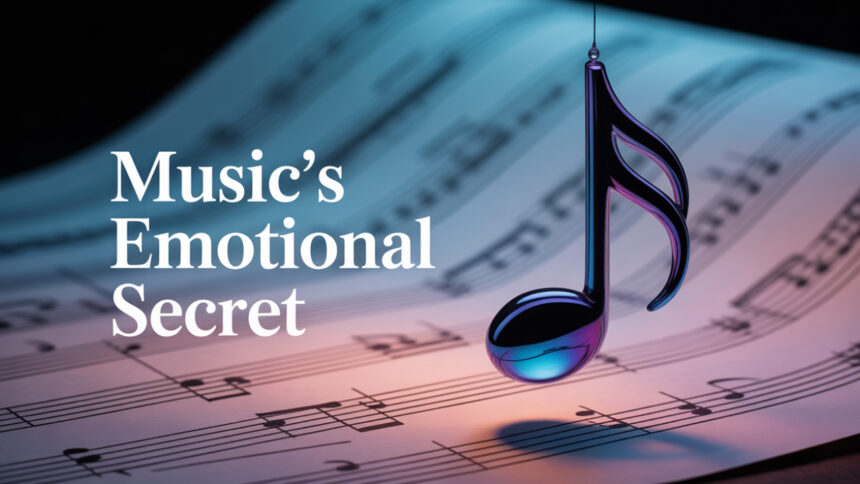You’re driving alone, a song comes on, and suddenly… your chest tightens. Your eyes sting. The tears come without warning.
But why?
It’s not just nostalgia, not just “a sad song.” There’s something deeper happening—something biological, psychological, and even spiritual that explains why music can cut through us like a scalpel and leave us reeling in emotion.
In this post, we’ll explore the hidden science of why some songs make us cry—from how the brain processes music to the emotional triggers hidden in melodies, lyrics, and memories. Whether you’ve sobbed to Adele, broken down to Bon Iver, or felt an unexplainable ache listening to a film score—this is the story of what’s happening inside you.
🎵 1. Music Is a Language the Brain Understands Emotionally
Unlike spoken language, which the brain processes in specific areas (like Broca’s and Wernicke’s regions), music lights up multiple parts of the brain simultaneously—especially those involved in memory, emotion, and reward.
Research from neuroscience shows that music stimulates:
- The amygdala (emotional processing)
- The hippocampus (memory formation)
- The nucleus accumbens (reward and pleasure)
- The prefrontal cortex (decision-making and emotional regulation)
This cross-brain activation is part of why music feels so immersive and powerful—and why it can bypass logical thinking and hit straight at the heart.
TL;DR: Your brain reacts to music as if it’s an emotionally rich conversation—even if no words are spoken.
😢 2. Tears Triggered by “Chills”: The Neurochemical Rush
Ever get goosebumps from a particular note, drop, or lyric? There’s a name for that—it’s called frisson.
Frisson (pronounced free-sawn) is a sudden, intense reaction to music that feels like a shiver running down your spine, often followed by an emotional surge. Studies show frisson is caused by:
- Unexpected harmonies or chord changes
- Emotional vocals or dynamic shifts in volume
- Lyrics that tap into personal meaning
When this happens, your brain releases dopamine—the same chemical tied to pleasure, love, and reward. Ironically, the music that makes us cry is also pleasurable at a neurochemical level.
This blend of pleasure and sadness is emotionally complex—and often leads to tears.
🧠 3. Music Taps Into Deep, Unconscious Memory
Ever hear a song you haven’t heard in years and feel like you’re back in your childhood bedroom, heartbroken and 15 again?
That’s because music is uniquely tied to episodic memory—our ability to recall specific events and emotions. The brain stores music alongside memories. So when you hear a song associated with a strong emotional experience, it re-activates the feelings you had at the time—even if it’s been decades.
This is especially powerful for:
- Songs played at funerals or weddings
- “Our song” in relationships
- Music from a formative time (usually between ages 12–25)
You’re not crying over the song—you’re crying over everything it brings back.
🎶 4. The Science of Sadness in Sound
Some songs are emotionally intense even when you’ve never heard them before. Why? Because music is built from emotional cues that your brain knows how to read.
Sad music often contains:
- Minor keys: Associated with melancholy or introspection
- Slow tempos: Which mirror a slowed heartbeat, associated with sadness or grief
- Descending melodies: Mimic sighing or crying
- Sparse instrumentation: Leaves space, creating vulnerability
Even without lyrics, your brain recognizes these cues and may respond emotionally. It’s the universal emotional grammar of music.
💔 5. Lyrics That Speak the Unspeakable
Sometimes it’s not the melody—it’s the words.
A song lyric can hit harder than an entire therapy session when it puts language to feelings you’ve struggled to express. This emotional resonance happens when the lyrics:
- Reflect your own experience
- Validate emotions you’ve hidden
- Tell the story you never dared to speak
This is why heartbreak songs feel so personal. They mirror your inner world and give it form—making you feel seen, heard, and sometimes utterly undone.
🧬 6. Empathy and Mirror Neurons: Feeling Others’ Pain
Neuroscientists have identified something called mirror neurons—brain cells that activate not just when you feel something, but when you observe someone else feeling it.
When you hear a singer’s voice crack, or the ache in a cello’s cry, your mirror neurons respond as if you’re experiencing that emotion yourself.
You might not be sad, but the raw vulnerability in someone else’s performance transmits emotion to you. This is emotional contagion in action—and it can move you to tears even if the song isn’t “about” you.
⛅ 7. The Paradox of “Sweet Sorrow”: Why Sad Songs Feel Good
You’d think sad music would make us feel worse—but studies show the opposite. People who listen to sad songs often report:
- Emotional catharsis
- Feeling more connected
- A sense of relief or clarity
This is the emotional paradox: sad music validates your feelings in a safe, structured way. It allows you to feel deeply without being overwhelmed—because there’s a clear beginning, middle, and end.
Crying to a sad song isn’t weakness—it’s emotional release, neurochemical regulation, and even a form of healing.
🌍 8. Culture and Conditioning: Why Some Songs Move Entire Generations
It’s not all biology. Culture matters, too.
Some songs carry collective emotional weight:
- “Hallelujah” by Leonard Cohen evokes grief and transcendence.
- “Fix You” by Coldplay often appears in tragedy montages.
- National anthems or protest songs bring tears of pride or pain.
These songs are wired into our cultural memory. They become vessels for shared emotion—joy, loss, resilience—and hearing them activates both personal and collective feelings.
🧒 9. The Inner Child Responds to Melody
From the womb, we are exposed to sound. The mother’s heartbeat. The rise and fall of voice. Lullabies.
That means music predates language in your life. Certain tones, melodies, or rhythms speak directly to the preverbal brain—the part of you that felt long before you understood words.
This is why instrumental pieces, movie scores, or childhood lullabies can evoke primal, preverbal emotion. You don’t just hear them—you feel them in your bones.
🧘♀️ 10. Music as a Safe Space for Suppressed Emotions
Many of us suppress emotion in daily life—either because we’re too busy, or because we learned it’s “not okay” to cry.
But music is a socially acceptable portal to feel. You don’t need to explain your tears. You can just say: “This song got me.”
In that moment, the song becomes a therapist, a confessional booth, a best friend. It holds space for whatever you need to release—and it expects nothing in return.
🎧 What Type of Music Makes You Cry? A Closer Look at Musical Triggers
Here’s a breakdown of common musical triggers that evoke tears:
| Trigger | Why It Works | Examples |
|---|---|---|
| Minor keys & slow tempo | Evokes melancholy and introspection | “Someone Like You” – Adele |
| Swelling orchestration | Builds emotional tension and release | Movie scores, e.g., Interstellar OST |
| Soulful, raw vocals | Triggers empathy via vocal inflection | “Hurt” – Johnny Cash |
| Nostalgic lyrics |


